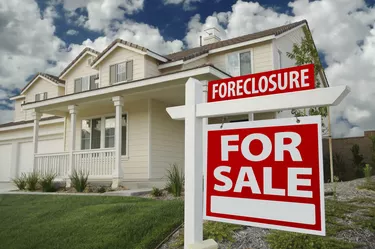
Mortgages and foreclosure processes are determined by the contracts that lenders create and the state and federal regulations that apply to the debt. The U.S. government changes its regulations in order to keep up with the real estate market and any key financing trends in the economy but the basic laws governing the process are very stable. The language used to describe mortgages and foreclosures in government regulations often uses the phrase "in rem." A common legal phrase derived from Latin, in rem applies to the general foreclosure activity.
What In Rem Means
Video of the Day
"In rem" means that a lawsuit is being directed solely against a property instead of a person. When a court makes an in rem decision it makes it regarding the property itself and laws concerning property regardless of who owns it. In an in rem case the rights of the property, and not an owner's interest in terms of its physical position and land laws, are paramount. In rem can be translated as "against the thing" as opposed to action against the person.
Video of the Day
Meaning of Foreclosure
Foreclosures tend to be naturally in rem, which is why the language is not commonly used outside of legal codes. It is assumed that the foreclosure is against a property and not a person. A mortgage uses the house as collateral, which automatically makes any lien a lender files in rem or a way to gain value by seizing and selling the house. An in rem action to foreclose is a legal action to create a foreclosure sale so a lender can be paid.
Limitations of In Rem
In rem creates limitations on foreclosure. If an action is in rem then the court can only make a decision regarding property that falls under its authority. A court in one state cannot order a foreclosure against a property in another state, in other words. Only a local court in the state in which a property is located can create a foreclosure. Courts must also notify owners and anyone who has an interest in the property before making foreclosure decisions.
Foreclosure Liens versus Judgment Liens
A foreclosure lien should not be confused with a general judgment lien. A court creates a judgment lien so that a lender can collect debt from a borrower, often when the debt was not secured by collateral. In this case the judgment often affects the person, and through the person, any property owned. This can result in a foreclosure, but also in garnishment of wages and other value that the debtor in question possesses.